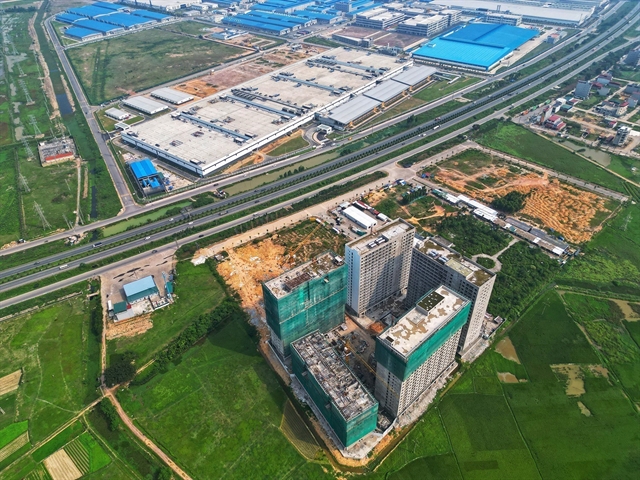Key issues in land valuation process must be addressed
Land valuation has been said to be a major bottleneck in Việt Nam's socio-economic development, said Deputy Prime Minister Trần Hồng Hà during a government meeting on Monday.
 |
|
A new residential housing project under construction in the northern province of Bắc Giang. VNA/VNS Photo Tuấn Anh |
HÀ NỘI Land valuation has been said to be a major bottleneck in Việt Nam's socio-economic development, said Deputy Prime Minister Trần Hồng Hà during a government meeting on Monday.
The deputy PM said improper application of methods or the use of subjective, non-transparent, and inaccurate data inputs employed during the valuation process has often resulted in inaccurate pricing and caused revenue losses to the State budget. Additionally, the complexity of valuation methods and the lack of comprehensive and reliable land price databases in the market also contribute to inconsistent results.
He said the forthcoming amended Land Law will provide a legal framework to establish a land prices database and land value map for the country.
In a report by the Ministry of Natural Resources and Environment (MoNRE), there are currently five different methods to evaluate land prices used by Government agencies: direct comparison, deduction, income, surplus, and land price adjustment coefficient methods. The aim of said methods has been to bring prices closer to market level, minimising losses to the State budget, and ensuring the rights of landowners whose land is being acquired.
However, in the last decade, there have been concerns voiced over their shortcomings and limit ations. Certain localities are still uncertain in their application, affecting the progress of determining land prices. Some land valuation methods are not suitable for real market information conditions, and the transparency of land use rights is lacking, making them inconsistent with state management on land prices, especially in the absence of a complete land price database.
The ministry said it's high time the country reviewed and revised its land valuation methods, as well as created new procedures. In addition, detailed guidance should be given to local authorities to help them with the implementation of such methods. This is especially important as the new approach to land valuation places local governments at the centre with additional autonomy and delegation of power.
The new approach should aim to minimise assumptions and subjective preferences, ensure uniformity in selecting and applying these methods, specify the information sources required for applying each method and expand the cases in which the land price adjustment coefficient method can be used.
Economist Cấn Văn Lực urged the Government to quickly establish a set of criteria for cases where additional valuation methods are required, with consideration given to data collection capabilities and the conditions of the land being valued.
Regarding the surplus method, he said that the law should provide detailed and specific guidelines for determining initial assumptions, such as expected future profits and forecasted incurred costs when implementing projects.
Nguyễn Tiến Thỏa, chairman of the Vietnam Valuation Association, said as each method has different application conditions, there must be very detailed and specific criteria and guidelines for each.
Land information
Deputy Minister of Finance Nguyễn Văn Chi stressed on the importance of a strict and scientific method in collecting land information.
"Collecting information is the first, and the most crucial step in the valuation process. Without a proper database of information, it doesn't matter what methods are being employed," said Deputy Minister of Public Security Lê Văn Tuyến.
He said a large number of violations during the process have been committed by Government officials and businesses, often to put lands' value significantly lower than their market level.
Representatives from Hà Nội and HCM City, two of the country's largest cities, and the Vietnam Real Estate Association voiced their concerns over a number of issues regarding current legal frameworks, procedures and valuators' responsibility and accountability.
The Deputy PM instructed MoNRE, the Ministry of Finance and the Ministry of Construction to closely collaborate with other ministries to clarify the criteria and conditions for collecting information and input data for each specific land plot or project.
"The criteria for input information must be standardised, transparent, publicly available, simple, and feasible to serve as the basis for applying the appropriate valuation method," he said.








